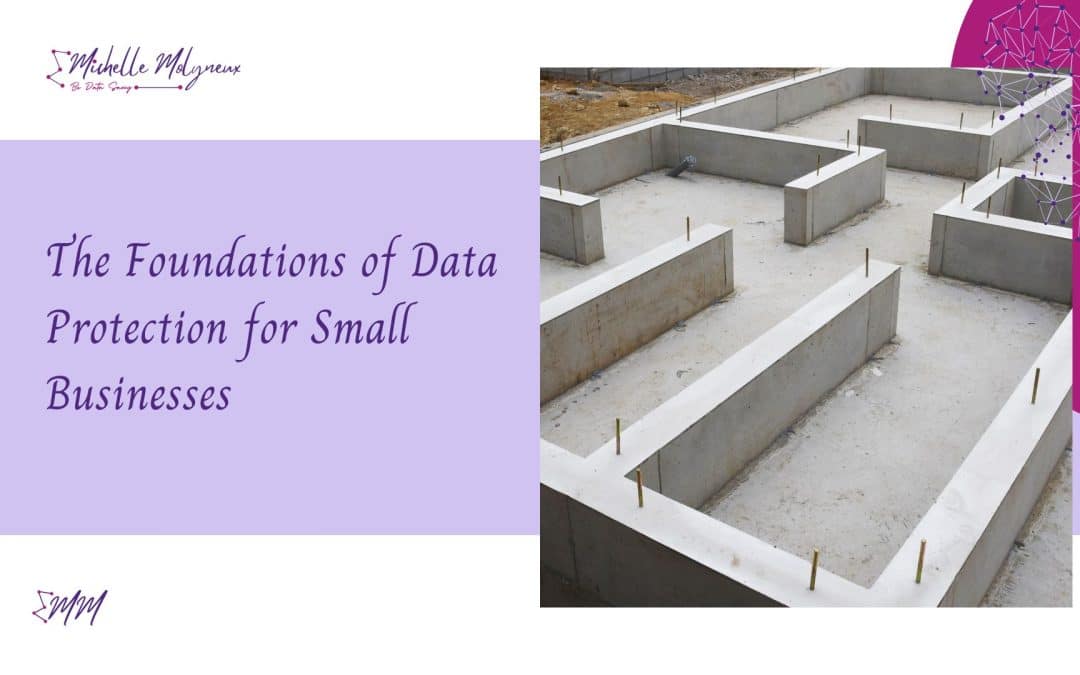I know data protection and business compliance sound like nightmares and time-consuming tasks. However, putting the foundations in place can significantly benefit your business. Regulations don’t stop you from doing things; they amend how we do them.
I know everyone keeps saying you need data protection because it is a legal requirement, but being data compliant is so much more than that. Having the systems and processes in place to ensure data privacy compliance has several benefits
- It builds customer (and employee) trust. Customers are likelier to trust and engage with businesses prioritising their privacy and data security.
- Competitive advantage: Customers are increasingly more privacy-conscious, and having systems in place can differentiate your business
- Reduces the risk and impact of data incidents and breaches
- Foundation for growth
Understanding Data Protection Laws
In the UK, data protection or privacy is regulated by three main regulations: the UK General Data Protection Regulation (GDPR), the Data Protection Act 2018, and the Privacy Electronic Communications Regulations (2003).
The laws are designed to safeguard individuals’ privacy rights and ensure that data is collected, processed (used), stored and disposed of securely and lawfully. The fundamental principles and the Individual’s (data subject) rights are essential.
According to Article 4 of the GDPR, personal data is any information related to an identified or identifiable natural person. In other words, personal data is any data linked to a living person’s identity.
Personal data is funneled into two categories – those that control the data and those that process the data (controllers vs. processors).
Steps Towards Compliance
1. Know all the data your business collects
Review the data you collect within your business activities and procedures by doing an audit.
From the audit, create a comprehensive map of your data usage and any records of processing activities. Ensure you include all areas or departments engaged in data processing. This typically includes HR, recruiting, marketing, business intelligence, accounting, development teams and technical support. Mapping out your data allows you to assess the risks with your current data handling procedures and figure out new measures to address them best.
2. Risk assess your data requirements
Organisations should only collect essential data to be GDPR compliant. Accumulating sensitive data without a compelling reason will signal alarm bells for the supervisory authority monitoring your compliance.
All data requirements should be scrutinised through a Privacy Impact Assessment (PIA) and a Data Protection Impact Assessment (DPIA). These impact assessments are mandatory when the data collected is highly sensitive.
I know, I know. PIA and DPIA sound the same, but there are some subtle differences. A Privacy Impact Assessment (PIA) is all about analysing how an entity collects, uses, shares, and maintains personally identifiable information related to existing risks. A Data Protection Impact Assessment (DPIA) is all about identifying and minimising risks associated with the processing of personal data. They are both different forms of risk assessment.
The Information Commissioner’s Office has created a DPIA template that can be used as a guide for data protection assessments. This template provides a deeper context into the activities that require a DPIA to help you decide whether your particular processing activity requires an evaluation.
3. Data incident and breach reporting
An incident or breach is any negative occurrence that impacts data protection or security. This term encompasses various situations, from those typically addressed by IT service desks to broader business continuity issues. Such incidents can involve both digital and physical records and range in severity from minor, affecting a single individual’s data, to major, impacting millions of records.
Incident reporting serves as a mechanism for notifying relevant authorities about any abnormal event, problem, or situation that might result in unwanted outcomes or breaches of established policies, procedures, or norms.
Breaches fall into three main categories:
- Confidentiality breach: Unauthorised or accidental disclosure or access to personal data.
- Availability breach: Unauthorised or accidental loss of access to, or destruction of, personal data.
- Integrity breach: Unauthorised or accidental modification of personal data.
No matter whether it is an incident or a breach, it needs to be reported internally and risk assessed to determine whether it needs to be reported to the ICO. If required, the report to the ICO must be done within 72 hours.
4. Data Protection transparency
One of the fundamental principles is transparency. This means you must clearly explain how you collect personal data from users on your website or through business interactions. You must ensure a privacy policy, cookie policy, and user-friendly guides explaining how you handle your users’ data. We offer a Website Bundle, a standardised solution consisting of a Privacy Policy, Cookie Policy, Terms of Use, and guidance on ensuring a legally compliant website. For B2B startups, it also includes Data Processing Agreements to protect the data of client companies.
5. Ensure policies, procedures, and processes are in place
Based on the results of your data assessment, it is recommended that you start creating relevant data protection policies, which include security policies and a new set of procedures for addressing data requests from your users. From a technical perspective, your policies should ensure that each data operation has protective measures to prevent breaches. These measures should also control access to the data, for example, by implementing two-factor authentication to prevent unauthorised access. If necessary, you should encrypt and mask the data and use antivirus and firewall software to help you monitor any threats to your data security.
6. Implement training
Human error is the number one cause of personal data breaches, so start building a privacy culture in your company. Familiarise your employees with basic privacy concepts and train them to perform their data protection compliance and information security duties.
7. Set up data processing agreements
It would be best to manage relationships with partner companies that receive your customer data and work with them using appropriate data protection agreements. Another critical point is international transfers: if your partners or suppliers are located in another country, this will require additional contractual safeguards to ensure the proper handling of client data.
8. Appoint a privacy professional
Last but not least, consider whether you need a Privacy Manager or a Data Protection Officer, a professional who oversees data protection compliance within the company. An internal employee or an external contractor can perform these roles. Learn more about data protection officers in our article on Virtual Privacy Professionals. Alternatively, book a clarity call to see how we can support you.
Privacy compliance is not just about measures; it’s about your and your company’s mindset. Data protection can become your competitive advantage if you treat your client’s privacy as a company value.

